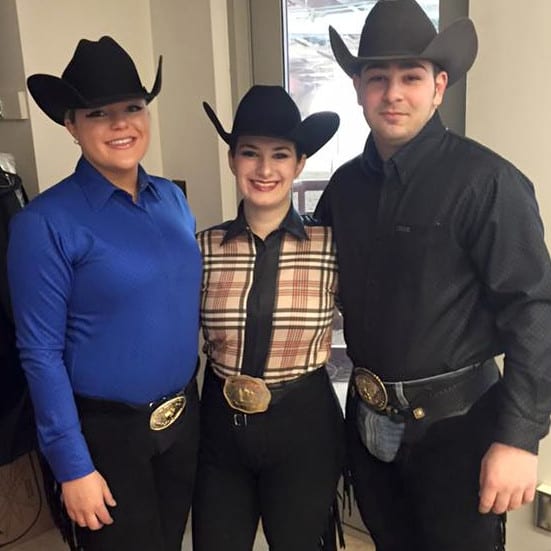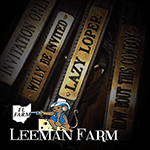With the 2016 NCEA Equestrian National Championships behind us, and the Intercollegiate Horse Show Association (IHSA) National Championships right around the corner, many intercollegiate riders are reflecting on their time on a team. It is no doubt that Intercollegiate Equestrian is an entirely different world from traditional competition. As a member of the Cazenovia College Equestrian Team in Cazenovia, New York, I’ve had the opportunity to learn and grow more than I ever thought possible.
Here are just a few of the things I’ve learned as a member of an Intercollegiate Equestrian team:
1) Different may be intimidating, but it isn’t bad
Intercollegiate riding is a culture shock for those of us who grew up with traditional horse showing. The concept of showing a horse you know very little about with no warm up could make even the most confident rider uneasy. When I first joined my college’s IHSA team, the thought of showing a horse that was not my own terrified me. I found comfort in knowing my horse’s buttons, but with IHSA, that is not always the case. Practice was intimidating as well. I was used to private lessons with my trainer. On an IHSA team of 25 or more individuals, this is not possible. Practices are intense. Two coaches standing in the middle of the pen while 10 riders extended trot around them without stirrups would strike fear into the heart of any equestrian… especially at 6 AM.
However, I quickly learned to embrace the different. All of the things that made it intimidating also made it fun. Riding new horses taught me to be a more adaptable rider. By doing this, my weaknesses were brought to the surface, allowing me to improve more than I ever could if I stayed in my comfort zone. While team practices were nerve wracking at first, they quickly became enjoyable. While I did not receive the one-on-one attention I was used to, I was able to learn and grow from my fellow teammates. These things made the “different” become my new normal… a normal that I am forever thankful.
2. Hard work wins in the end
A teammate of mine, Kimberlyn Beaudoin, said it perfectly when she said “It’s not about how good you are, it’s about how hard you work.” This is definitely the case on an intercollegiate team. The most talented rider will not be an asset to the team if they don’t put in the work. Intercollegiate equestrian isn’t just about showing, it’s a team event. The mornings are early, the days are long, and the horses are rarely world champion quality. Those who do not want to put in the work are quickly weeded out. Even the most talented rider can crash and burn if they do not have the drive to work hard, in and out of the show pen. A rider that may have less experience can easily find success if they are willing to put in the time and have the drive to succeed.
3. Everyone starts somewhere
One of the great things about IHSA is that it has a leveling system, with divisions those who have never ridden before, all the way up to world champions. It may be easy for those of us who have “been there, done that” to forget where we started. Joining my school’s IHSA team gave me an entirely new appreciation for those just starting out. Many of the beginner riders I’ve come across are athletes from other sports teams that wanted to try something new or the boyfriend of a team member that had been coerced to join by their significant other. Watching my peers fall in love with the sport I had been a part of my entire life brought that fire back inside myself that had somehow grown a little dull over the years. Many times, these beginner riders were the most motivated of anyone on the team.
4. Confidence is key, but overconfidence is fatal
While confidence is an essential part of being successful in the show pen, the moment you become overconfident is going to be the moment you fail. I learned this the hard way. I was feeling entirely too confident going into the pattern portion of my class at the regional competition. I had drawn a fantastic horse and had a great rail portion. When I walked up to the cone, I felt completely ready. When the judge nodded, I jogged off with confidence, perfectly poised. The pattern felt flawless. I finished, completely convinced that I had won the class. That is, until the judge came up to me and asked me if I remembered my first turn. I had turned right. The pattern called for a left turn. That one small mistake kept me from qualifying for semifinals. I was so overconfident that I was going to win, that I became careless and made one wrong turn-literally.
5. Be willing to take the blame
When I asked NCAA Equestrian Paige Kemper what her experiences as a Division 1 equestrian taught her, the first thing she said was that, 90% of the time, the horse is not at fault. Anything that goes wrong in a class can usually be tied back to the rider in some way. The lazy thing to do when we have a bad ride is to place the blame somewhere other than ourselves. Its east to blame the horse, the saddle, the judge, or the other riders. When it comes right down to it, though, we are generally to blame for things that go wrong. When we accept this, we are able to make steps toward improvement. If we stick our head in the sand and pretend we did nothing wrong, we will stay stagnant in our abilities.
6. You can never own too much lipstick
On my team, everyone likes to joke about the fact that I have a makeup addiction. I can’t deny it… I do. I show up to every show with a makeup bag that could rival Sephora’s inventory. Because of this, though, you can guarantee that no one on my team will go into the pen looking less than perfect. My favorite part of shows are the early mornings when all of the girls on the team are together getting ready. After many morning helping my peers apply their makeup, I’ve realized that something about a great red lipstick that will bring out the confidence in anyone.
7. 6 AM really isn’t that early
All equestrians are used to early mornings. Intercollegiate equestrians are no exception. Waking up at an ungodly hour of the morning becomes a lot easier when you have dozens of others joining you in that venture. Teams become well-oiled machines that early in the morning. Part of it is because of the unwritten rule that complaints are not accepted, because we’re all in the same boat. Part of it is because there’s a Dunkin Donuts on the way to the barn.
8. “Fake it till you make it” is sound advice
As previously mentioned, joining an intercollegiate team is intimidating at first. No one really knows exactly what they’re getting in to when they first join a team like that. The atmosphere cannot be put into words. Being thrown right in and going with the flow is the best way to learn. In the show pen, you will have many experiences you may not have had in a traditional show environment. The best way to make it? Don’t let your nerves show. Don’t be afraid to ask questions. After a couple months, you’ll look back and wonder why you were ever worried. Until then, keep your chin high, don’t get discouraged, and fake it till you make it.
9. Always say thank you
It’s easy to get caught up in the moment, especially at an IHSA show. It is common ground to be tired, stressed, and excited all at the same time. In the midst of that, thought, don’t forget to say thank you. Thank the horse handler that is caring for the horse you just showed. Thank your coach for the hours that they put in with you personally, especially since they are doing the same for many other riders. Thank your teammates for always supporting you. Most of all, thank the horses, for making all of this possible.
10. No one finds success alone
As cliché as it sounds, there is no “I” in team. Intercollegiate competition is unique from other areas of the horse industry because of the fact that it is a team event. A successful team is not one where every rider only looks out for themselves. Supporting your teammates, listening to your coaches, and working as one unit is essential to winning in this sector of the industry. In fact, that’s what makes it all worthwhile. The relationships you build and the memories you make as a member of a team far outweigh a title or trophy.









